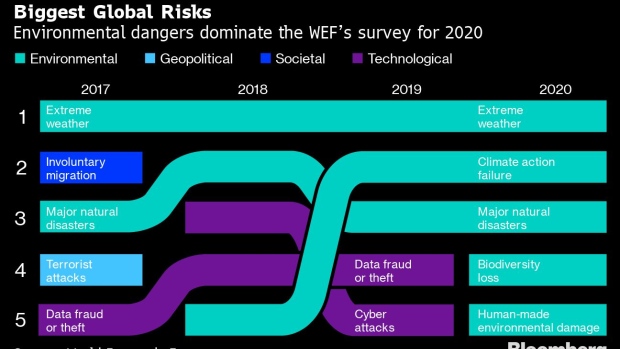Jan 15, 2020
World’s Biggest Long-Term Risks Are All Environmental, WEF Says
, Bloomberg News

(Bloomberg) -- Sign up here to receive the Davos Diary, a special daily newsletter that will run from Jan. 20-24.
The World Economic Forum is sounding alarm bells on climate change, with environmental risks occupying the group’s top five long-term concerns for the first time on record.
Extreme weather events, the failure of climate-change mitigation, major natural disasters, biodiversity loss and human-made environmental damage were the risks identified as most likely by respondents in the WEF’s 2020 report. It’s the only time in the survey’s 14-year history that climate-related concerns took all top spots.
Economic confrontations and domestic political polarization were also recognized as short-term issues by global experts and decision-makers, the report published Wednesday showed.
Confronting climate change will be a key topic of discussion when business and political leaders meet in Davos, Switzerland, for the WEF’s annual meetings next week. In a presentation prepared for the meeting, Deutsche Bank strategists said that the “question of our age” is how much societies would be willing to sacrifice in economic growth to reverse climate change, and that governments will need to work across borders to find solutions.
“The political landscape is polarized, sea levels are rising and climate fires are burning,” said WEF President Borge Brende. “This is the year when world leaders must work with all sectors of society to repair and reinvigorate our systems of cooperation, not just for short-term benefit but for tackling deep-rooted risks.”
Failure to work together would be “catastrophic” for addressing challenges like the climate crisis and species decline, according to the report.
The WEF report also called on policy makers and firms to match targets for protecting the climate with ones that boost economies, and for companies to adjust to science-based targets now in order to avoid massive future losses.
“We are already seeing companies destroyed by failing to align their strategies to shifts in policy and customer preferences,” said Peter Giger, group chief risk officer at Zurich Insurance Group. “Transitionary risks are real, and everyone must play their part to mitigate them.”
--With assistance from Samuel Dodge.
To contact the reporter on this story: Jill Ward in London at jward98@bloomberg.net
To contact the editors responsible for this story: Fergal O'Brien at fobrien@bloomberg.net, Zoe Schneeweiss, Brian Swint
©2020 Bloomberg L.P.